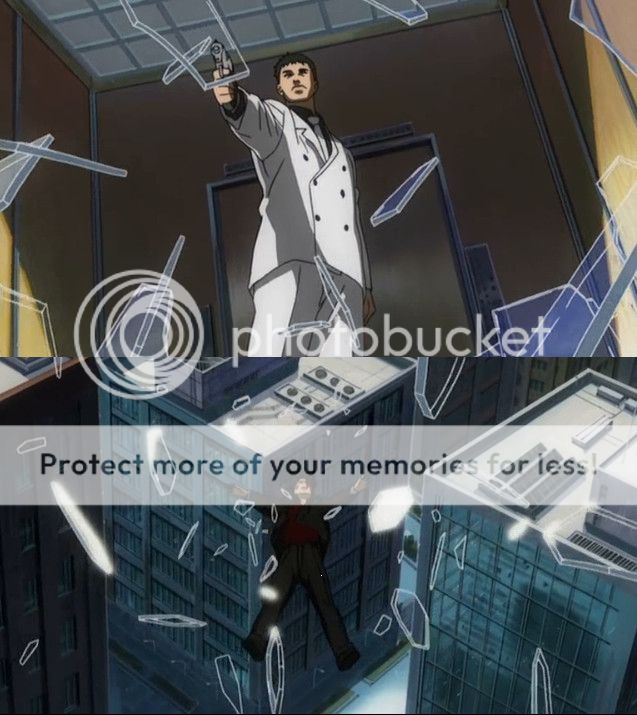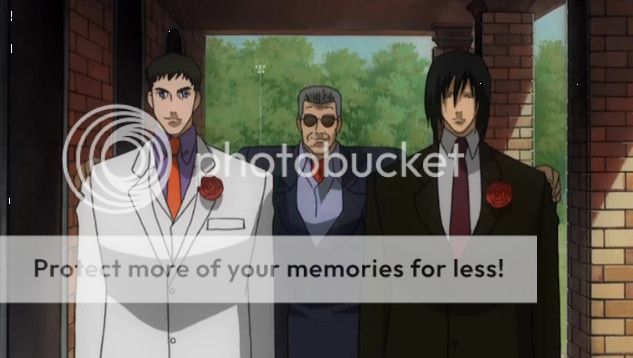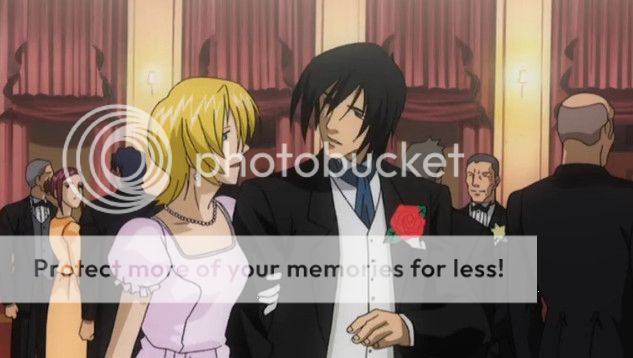Wednesday, March 20, 2013
Ink Black Analysis - Gungrave
"Were we wrong? Did we make the wrong decision after all? I can't seem to remember when things started to take a turn for the worse. In the end it turned out like this. Still..."
Gungrave is a 26-episode anime produced by Madhouse based on a Playstation 2 game of the same name by Sega and Yasuhiro Nightow. It first aired in 2003, and is currently licensed by Funimation, formerly held by Geneon.
For reasons she doesn't understand, young Mika Asagi is being hunted down by the terrifying mafia syndicate known as Millenion, and they've sent their greatest weapons after her, their mindless modified soldiers known as Orgmen. There is only one man who can protect her, and after giving his life for her mother and father he comes back from beyond the grave to do it all over again. Beyond the Grave is the name he adopts, but in life he was known as Brandon Heat, and the man known as Bloody Harry, the merciless boss of Millenion Harry MacDowel, was his best friend. They joined Millenion together, climbed the ladder and supported each other as they tried to reach the top. Then, something happened that turned them against one another, and now as Grave he must confront Harry once again. Did Harry betray Brandon, or did Brandon betray Harry? In the mafia, nothing is as simple as it appears.
Boy, this sure was made by the creator of Trigun. That was one of the first observations I made while watching this anime, and it held true to the end. Many creators have some recurring styles and motifs shared between their works, and comparing it to such a well-known and well-loved classic has the capacity to be both good and bad. It certainly doesn't help that this was also adapted from a video game; game adaptations in general rarely fare well, and from what I've heard the original game itself was mediocre at best (I haven't played it though, so take that with a grain of salt). With such a strange, potentially disastrous production history I honestly didn't know what to expect going into this series. It's still very much its own thing, but its creative background is definitely notable enough to warrant mention. Don't make a drinking game out of the times I say "Trigun" or "video game" in this review, because it will kill you. Just wanted to get that out there.
Madhouse of the early 2000s wasn't as consistently solid a studio as they are now, and Gungrave is definitely a little rough around the edges. Nightow's character designs definitely give the show a distinct flavor, leaning more toward realism than Trigun but still retaining a tendency toward some weird proportions, with scraggly limbs, long faces and broad shoulders. Grave's design in particular looks like the unholy lovechild of Legato Bluesummers and Brilliant Dynamites Neon. It's a rough, harsh-looking series, nary a bishonen to be seen, and I think that's what they were going for. The style takes a little getting used to, and when the budget drops it can be hard to keep those designs appealing, but when the animation hits its stride it looks great. Of particular note is its use of lighting and lens distortions, which add a lot to some already incredibly tense moments. Like Black Lagoon, another famous gunfighting Madhouse series, the action scenes occasionally amount to the characters standing in one place shooting without worrying about getting shot, but thankfully this gets phased out in time for the climactic battles later on. The animation isn't great, but it's good. Let's leave it at that.
This series boasts a strong soundtrack that's largely comprised of vaguely Italian-sounding string and orchestra pieces with a little synth mixed in, generally sticking to the mafia motif while ranging in tone from warm and familial to cold and dangerous. There's some really good music here, but weirdly enough I think Gungrave is at its best when there's no music at all. This series thrives on quiet character moments, and some of its best scenes go by in complete silence. There are some exceptions, but on a whole the music for this series is at its best when it's either gentle and understated, diegetic (from a source that the characters themselves can hear, like a radio) or just not there at all. The soundtrack is still great, though, so you should definitely give it a listen if you ever get the chance.
The cast of this series is 99% populated by gruff old men, which means the Los Angeles pool of voice actors is perfect for the job. All the big boys are here: William Frederick Knight, Michael McConnohie, Beau Billingslea, the list keeps going. The Japanese dub was very good as well, but there's one actor in the dub who steals the show completely, and that is Tony Oliver as Harry. His Japanese seiyuu, Kenji Yamada, plays him as fairly laid-back, in control but unassuming. Tony Oliver, on the other hand, seems to understand the character much better, his voice always carries a twinge of aggression. Harry is a very ambitious character, someone who's always taking the initiative to get ahead, and Oliver captures that ambition with every word he speaks. Kirk Thornton, Steve Blum and a several others play their roles well, and Tom Wyner does a fantastic job as an older version of Harry in the second half of the show. As usual there are some awkward secondary characters here and there, but on a whole it's a laudable dub well worth listening to for Harry alone, though not quite good enough that I'd recommend it to dub haters.
While Trigun was well-known for its creative worldbuilding and grand concepts, the thing that really set it apart from the crowd was its strong beating heart, and the same can be said of Gungrave. Yes, there is technology that can revive the dead and create super-soldiers, not to mention a very well fleshed-out look at mafia operations and the underworld, but the thing that really holds this story together through it all is the concept of loyalty, and what it really means to betray someone. Millenion is held together by a cardinal rule known as the Code of Iron, which declares that all traitors to the organization, regardless of status or standing, receive an equal penalty: death. Such a code is simple in theory but exceedingly complex in practice, and the first half of the series, which follows Brandon and Harry's rise to power, takes full advantage of that ambiguity. Millenion's leader, Big Daddy, carries a lot of understandable guilt and self-doubt after dirtying his hands the way only a mafia boss could over the years, and the Code of Iron that forms the crux of his loyalty to those below him is how he comes to terms with it. The various members of Millenion, as well as several third-party characters, all have their own concept of loyalty, but it never becomes trite or stale the way shonen friendship speeches do.
That's not to say that the show is dour and political all the time, though, it's also very cool. The characters here all have ridiculous, over-the-top, completely badass names: Brandon Heat, Harry MacDowel, Balladbird Lee, Bear Walken, Cannon Vulcan, Laguna Glock, Blood War (no, seriously) and as yet another Trigun comparison there's even a character named Descartes. The mafia exploits are intriguing, the ways they make money and how they're integrated into the community is intricate and closely resembles how a real-life mafia would operate. Aside from the choreography hiccup I mentioned earlier, the battles are intense, imaginative in the different weapons and styles used but still very grounded and often telling us something meaningful about the characters involved without breaking suspension of disbelief... at least in the first half. Even when it gets really talky, Gungrave is never boring. This is a rare balance that keeps the show engaging if you don't want to think about it too hard, but there's still a lot of depth and subtlety to the characters here for those who want something more from their choice of entertainment.
The characterization, though, is definitely the meat of the story, and at the heart of it all are Brandon and Harry. Harry is ambitious to the point of ruthlessness, but his goals aren't without principles. His philosophy is that those with power are free not only to take what they want, but also to give it away, and while he's hardly a paragon of selflessness there's a lot more to his vision than pure egotism. He has a grand plan and believes what he's doing is for the best, which makes him extremely corruptible. Brandon is a much purer individual by contrast, and his goals are much simpler. He's quiet and unassuming (think "video game protagonist") but earnest and genuine. He just wants to live a happy life with his friends and loved ones, and if that means helping Harry climb the ladder then he'll become a mafia sweeper without hesitation, but he's also there to step in if his best friend strays too far off course. But of course, it's never that simple. As Brandon comes to love and respect Millenion's leader, Big Daddy, alongside his continuing relationship with his childhood friend Maria, it becomes clear that staying loyal to one might mean betraying another, and he has to come to terms with this in his own way. Several other side characters bring their own perspectives, but for the sake of brevity I'll not delve too far into them. Suffice it to say that the first half of Gungrave is one of the greatest betrayal stories in all of anime, right up there with Guts and Griffith. Now if only the story had a stronger sense of focus.
Once again following in the footsteps of Trigun, about halfway through Gungrave shifts its tone and focus dramatically and doesn't quite manage to tie up its loose ends. In the first half, a process known as necrolization is introduced that brings back the dead as super-soldiers. Okay, I could go with that, it's both necessary for Brandon to come back as Grave and a good way to fuel Harry's ambitions. In the second half, a new process is introduced that can transform living soldiers into mindless drones called Orgmen, as well as transforming their leaders into sentient monsters known as Superiors, and this is where it gets pretty ridiculous. Aside from a little added perspective to an already-peripheral "have I overstepped the boundaries laid down by god?" subplot, these elements serve next to no purpose and could easily have been written out completely with relative ease. Instead, it turns the show from grounded character drama to over-the-top action spectacle, and the show's video game roots start to rear their head. The Orgmen are video game mooks, and the Superiors are video game bosses, period. These fights are just there to be cool and action-packed, but that was never what Gungrave was really about.
Nightow is a creative man to a fault. He has a lot of grand, wonderful ideas but doesn't always know what to do with them. Maybe with more runtime or tighter writing it could have given meaning to the cacophony, but the world of Gungrave is a cluttered mess. Even in its stronger first half, the seeds of its oncoming problems were present--allusions to an unspecified war, Tomases from Trigun racing in the place of horses and some really outlandish technology make it clear just how little we know about the world of Gungrave, and it stays that way to the very end with disparate elements that really don't feel like they all belong in the same story. None of that, however, was as obnoxious as the inclusion of the Superiors, which took what could have been some of the most emotionally involving confrontations and made them... well, not bad, but they mostly didn't have nearly the impact they should have. It's hit-and-miss. In the last few episodes a rival faction comes pretty much out of nowhere just to make the ending fall into place. Thankfully, that very ending turns out to be the show's saving grace. It brings the story of Brandon and Harry full-circle in a way that's cathartic, completely justified and entirely satisfying.
I'm not sure whether I can truly call Gungrave "great" or not, but there's certainly a lot of greatness in it. The plot goes some weird and unnecessary places, and like Harry himself it becomes something of a victim of its own ambition, but the parts of it that shine through are truly fantastic. The humanity of its cast and the sincerity at its heart--not to mention a damn near perfect ending--are more than enough to blow past its flaws, and I warmly recommend it. Bring your lab coats and microscopes, next time we're graduating to Moyashimon. Until then, always keep it classy.
Special thanks to SkyCetacean for the request.
Final Grade: 8/10
Fantastic character drama shines through the unnecessary clutter.
Subscribe to:
Post Comments (Atom)









No comments:
Post a Comment